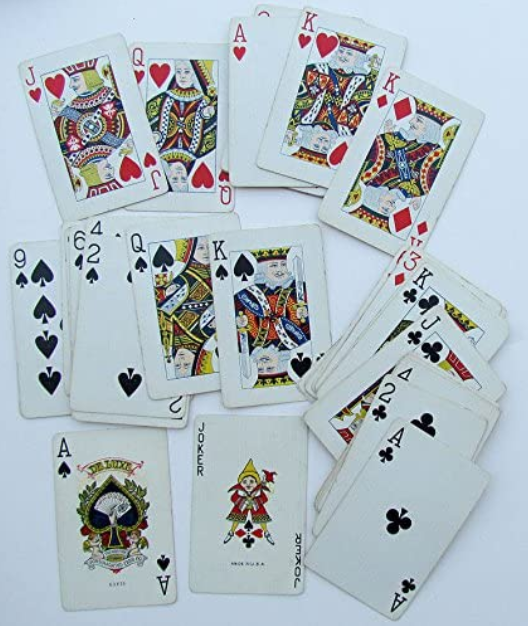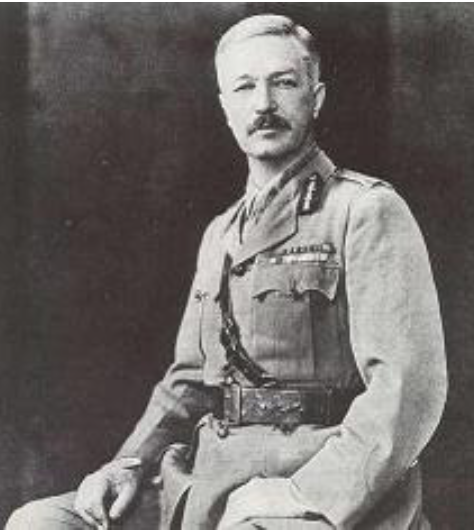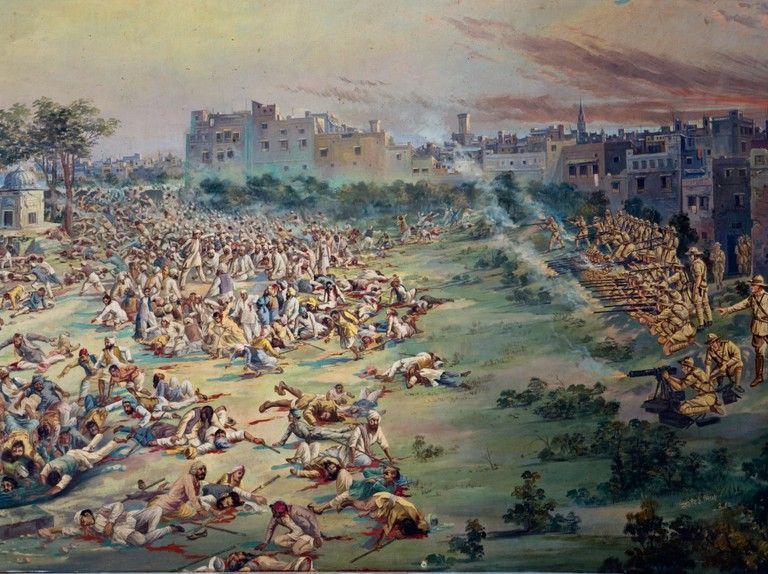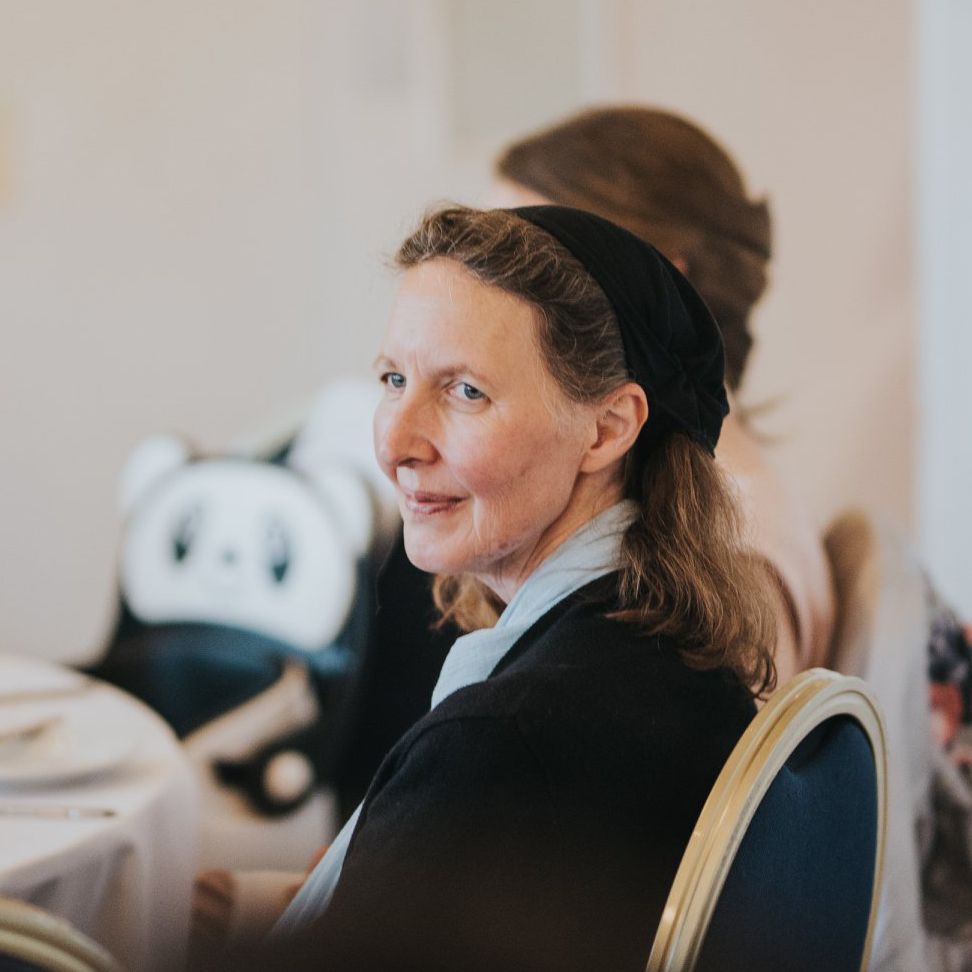Content Warning: This article includes a depiction of the Jallianwala Bagh massacre.
17th July - Twelfth Letter to Poppy
Secret diary: Sat
Official diary (17th July): No entry
Location: Waterpark House, Hartigan’s near Castleconnell
Saturday
My darling old Pip,
This rest cure has now lasted 3 weeks. The reason I dont get up till 12 is to pass the time, I am very well indeed as you will have seen from the photo in my last letter. Have got quite a lot of cuttings of likely houses from the Times. It will be very nice for you going to the Bax’s after leaving the Hall. I suppose I can get a room somewhere handy if I come over on leave. Glad to get such good news of you and Cutlett. (we shall have to call him Atty now) Im sure he’s a dear.
Someone is just going off to the post so will stop, and write a longer letter tomorrow.
your c
Twelfth Letter sent to Mrs C.H. Tindall Lucas, 1 Cleveland Gardens, Hyde Park LONDON W2 postmarked EASTBOURNE 6:15 pm 19 July 1920. The paper and the envelope are identical to that of letter No.11.

One wonders whether Poppy was completely taken in by CHTL's explanation of his late 'lie ins'. Of course the real reason he was in bed until 12 noon each day was because he was 'passing the time' playing cards with the lads until the early hours. He was indeed 'very well' and enjoying his ‘rest cure' at the expense of his captors. As long as he didn't get too bored he was fine. He was amusing himself cutting out advertisements for houses, an exercise which occupied him but, as it turned out, was a waste of time as the dream of a home together in Devon away from the army was not to come to true.
There can't have been any other hostages who filled their days looking at estate agents listings whilst being held. The normality of his task makes the situation quite surreal, but CHTL's dogged determination to carry on as normal as much as he could shows his unshakeable belief that this period would come to an end and that life would continue as it always had in the past. He was a survivor and survive he would! Poppy needed to be convinced of this and to be chided, goaded and encouraged to follow his lead and to keep going, believing in their future together. He needed her to stay strong. It was a case of:
"Buck up & stop sniffing, old girl. I shall look after myself so you need not worry about me." (letter to Poppy, 13 March1917) although he was being a little more gentle with her, realising just how fragile she was.
‘Atty’ was the name Poppy’s brother was called. ‘Cutlett’ was being christened ‘Arthur William’ after Atty who died at The Somme and who, being CHTL’s friend, had been the means of bringing Cutlett’s parents together. The name ‘William’ was the traditional name of all first born Lucas males going back many generations. Typically, as was the custom in both his parent’s families, Arthur William was called by another name -‘Bill’.
Meanwhile back in London The Right Honourable Austin Chamberlain MP was voicing his concerns about military recruitment in a memo to Winston Churchill:
Austin Chamberlain to Winston Churchill (17th July, 1920)
I think it right to let you know that, in view of the gravity of the military situation in Ireland and through the Middle East, I find it necessary to continue recruiting for the Army and Air Force to the utmost possible limits. We are still getting nearly a thousand recruits a week for the Army, and this is about the only resource open to us. The increased charge that will fall upon Army Estimates this year through the continuance of recruiting will be more than balanced by the comparative failure to raise the Territorial Army and by the postponement of the recruitment of the greater part of the Reserve.
I send you this intimation in case you should wish to have a Cabinet discussion on the Subject.
The Right Honourable Austin Chamberlain MP
The Churchill Archives
Ireland was not the only troublesome area of the British Empire wanting Independence: India had also contributed troops to fight defending the Empire in the Great War, and many Indians like the Irish believed that they should be able to govern their own country. Tragically, it wasn’t just the Irish who experienced the heavy handed suppression of perceived anti British behaviour. Another hot topic of the day was what should happen to Brigadier General Dyer.

Dyer is infamous for the orders that he gave on 13 April 1919 in Amritsar. It was by his command that 50 troops, opened fire on a non-violent gathering of unarmed civilians, men, women and children, at the Jallianwalla Bagh, in what later came to be known as the Amritsar massacre.
The civilians had assembled at Jallianwala Bagh to participate in the annual Baisakhi celebrations which are both a religious and a cultural festival of the Punjabis. Coming from outside the city, they may have been unaware of the martial law that had been imposed. The Bagh-space comprised 6 to 7 acres (2 to 3 ha) and was walled on all sides, except for five entrances. Four of the entrances were very narrow, admitting only a few people at a time. The fifth entrance was blocked by the armed soldiers, as well as by two armoured cars with machine guns. The vehicles were unable to pass through the entrance. Upon entering the park, the general ordered the troops to shoot directly into the gathering. The shooting continued unabated for about 10 minutes, and the soldiers' supply of 1,650 rounds of ammunition was almost exhausted.
Dyer is reported to have, from time to time, "checked his fire and directed it upon places where the crowd was thickest”, not because the crowd was slow to disperse, but because he "had made up his mind to punish them for having assembled there."Some of the soldiers initially shot into the air, at which Dyer shouted: "Fire low. What have you been brought here for?" Later, Dyer's own testimony revealed that the crowd was not given any warning to disperse and he was not remorseful for having ordered his troops to shoot. Official figures put the casualties at 379 identified dead, comprising 337 men, 41 boys and a six-week old baby, with approximately 1,100 wounded, of which 192 were seriously injured. Other sources report over 1000 dead.
Many historians believe that Churchill did think that Dyer was guilty of murder, but there were a lot of the public and the media of the day who thought that he was a hero in holding back a revolt. In these sort of situations, a ‘technicality’ is a politician’s useful answer.
17th July 1920
My dear Crewe*,
The normal procedure which would have been observed if the Hunter Commission* *had not been set up would have been much as indicated by you, but the question as to whether or not any reference to the army council would’ve been necessary would’ve depended on the nature of the action taken by the commander in chief in India. The point is somewhat technical, but in a nutshell, the army council would not have been concerned in this case unless the commander in chief in India, the secretary of state for India, had recommended that Brigadier General Dyer should be removed from the army, called upon to resign, or to retire.
In regards to the question you put to me as to whether or not there could be any question of trying Brigadier General Dyer by court-martial, I think it all depends on the view which is taken as to whether or not any offence was in fact committed. My own opinion is that the offence, if any, amounted to murder, alternatively, manslaughter. These Offences may be military offences as well as civil offences, and therefore it can hardly be said that Brigadier General Dyer could not be tried by Court Marshall because the offence he committed was not a military offence. If you will refer to Section 45(1) (a) of the Army Act, you will see that (inter alia) the offence of murder of manslaughter cannot be tried by Court Martial unless (inter alia) it was committed on active service. The point is highly technical, because it might be argued that the troops at Amritsar were on active service, but my own opinion is that the clear intentions of the Army Act are that the offences of murder and manslaughter must always be dealt with by the Civil Power if Civil Courts are available.
I will not, however, labour these technical points further, and if you would wish to be more fully informed I would send Major-General Childs to see you on Monday to explain the position to you at length.
You will notice that a question was asked in the House yesterday by Brigadier General Surtees as to the recent Act of Indemnity*** which has been passed in India. This has a bearing on the situation, and the answer will be found in “Hansard” of the 16th July on page 2791.
Churchill Archives
*Robert Offley Ashburton Crewe-Milnes, 1st Marquess of Crewe, KG, PC, FSA (12 January 1858 – 20 June 1945), was a British Liberal politician, statesman and writer. He had been Secretary of State for India 25 May 1911 – 25 May 1915
** “When World War One began in 1914, Indian citizens became heavily involved in supporting the British war effort through the provision of men and resources. By the end of the conflict, the appetite for Indian independence was growing and simmering civil unrest in Punjab threatened a large scale revolt. On 13 April 1919 large crowds gathered in Jallianwala Bagh, Amritsar, consisting of non-violent protesters against British martial law and religious pilgrims visiting the site as part of the Sikh festival Baisakhi. Earlier in the day a ban had been imposed by the British Indian Army which prohibited public meetings of such a size. Several troops surrounded the crowd and were ordered to shoot, killing an estimated 379 and wounding hundreds more. The British government established a committee to inquire into the events, and the Hunter Report includes evidence taken in relation to the events in Amritsar, and was published by the Government of India.” Source
***An Act of Indemnity is a statute passed to protect people who have committed some illegal act which would otherwise cause them to be subjected to legal penalties.
Churchill, the then Secretary of State for War, wanted Dyer to be disciplined, but the Army Council superseded by him decided to allow Dyer to resign with no plan for further punishment. Following Churchill's speech defending the council's decision and a debate in Parliament, on 8 July 1920 MPs voted for the government by a majority of 247 to 37; a motion calling for approval of Dyer's actions was defeated by a majority of 230 to 129. Dyer then settled in Britain. He was presented with a gift of £26,000 sterling, a huge sum in those days, equivalent to £1,052,047 in 2019, which emerged from the fund raised on his behalf by the Morning Post, a conservative, pro-imperialist newspaper which later merged with the Daily Telegraph the families of the victims killed at the Jallianwala Bagh eventually received Rs 500 (then equal to £37.10s.0d; equivalent to £1,497 in 2019) for each victim.

It seems incredible to us today that such a heinous crime could result in just a quiet retirement from the army and not even a court martial. Churchill had successfully court-martialled Lieut. Colonel Sherwood Kelly for speaking to the press about the waste of soldiers’ lives and public money in Russia. He also wanted to court martial CHTL for ‘allowing’ himself to be captured and for not fighting back (to the death presumably) and taking down as many combatants as possible. Yet here was a massacre of innocent Indians that was just going to be quietly put to one side. Tragically the inherent racism of the time trumped the need for justice. The ‘white’ general’s life who gave the command to fire was worth 700 times that of each of the ‘brown’ victim’s. This was far from the long held belief that the Lucas Quakers had held - that each person is “equal in the sight of God”. But then the British parliament was not influenced by Quaker beliefs and had their own interpretation of ‘Christian values’. Ireland and India had a fair amount in common in wanting to be truly independent. Although it took India around 25 years longer to reach their goal of being an autonomous nation.

